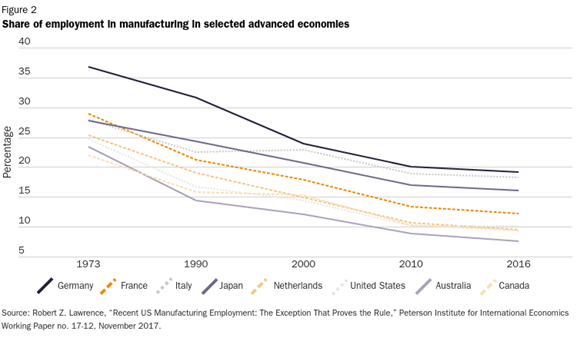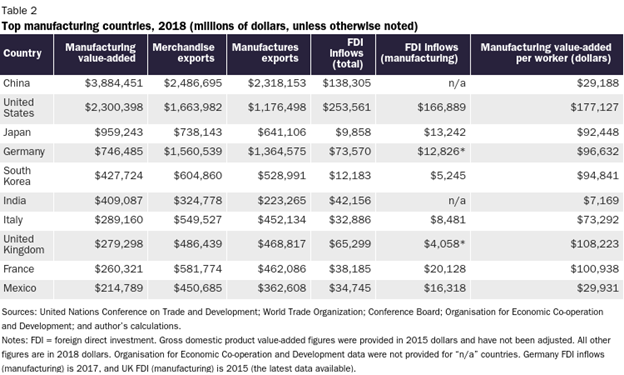
🚨My latest @CatoInstitute paper is out today🚨: "Manufactured Crisis: 'Deindustrialization,' Free Markets, and National Security" cato.org/publications/p…
It is VERY chart/data-rich (partially intended to be a longer-term resource).
Quick summary to follow (thread): /1
It is VERY chart/data-rich (partially intended to be a longer-term resource).
Quick summary to follow (thread): /1

Both the left & right increasingly justify protectionism & industrial policy not on economic grounds, but on "national security" or "resiliency" ones - especially re China and COVID-19. Notable targets are semiconductors & medical goods, but there are plenty of others too /2
The usual claim: “free markets” & a lack of govt support for US manufacturing crippled the industrial base’s ability to supply “essential” goods during war, pandemic, or other emergency. We thus need big new govt actions (tariffs, subsidies, 'Buy American,' etc) to rebuild mfg /3
As you can guess, I see many flaws* in the "security nationalism" thesis - even tho I & other free marketers (back to Adam Smith) acknowledge a limited, theoretical "national security" case for protectionism & other govt interventions:
*NOTE: all data are inflation-adjusted! /4
*NOTE: all data are inflation-adjusted! /4
First, the Death of American Manufacturing has been exaggerated. For starters, declining US mfg jobs & the sector's declining GDP share say little abt US industrial capacity bc these trends are happening everywhere, mostly independent of govt (trade/etc) policy /5 





Furthermore, despite popular claims that the US suffered broad declines in productive capacity, our manufacturing sector actually remains among the most productive in the world & has expanded since the 1990s—continuing earlier pd trends in output, investment & profitability /6 





That said, the topline data do hide big shifts in US manufacturing over 2+ decades in response to various economic forces (globalization, consumer tastes, etc.). It’s not just some big monolith, and certain industries have risen or fallen since the 90s.
BUT... /7
BUT... /7
Again the story is generally positive, esp in terms of “national security.” In particular, US production of durable goods (weapons, aerospace, vehicles, metals, computers/ electronics, ships, medical equipment, etc) increased a lot since '97 (and not just bc of computing power): 

On the other hand, US production of nondurable goods has sagged, primarily driven by declines in low-wage (textiles, apparel) or dying (paper/printing, tobacco) industries - declines offset by higher-wage/tech gainers (and food): /8 

The data a) refute the common “we make potato chips, not microchips” argument; & b) reveal a flexible/dynamic sector responsive to mkt forces. Overall, we traded some low-tech/dying industries for higher-tech/thriving industries.
It’s disruption, not “deindustrialization” /9
It’s disruption, not “deindustrialization” /9
Finally, this section looks at two industries in the news a lot these days - semiconductors and medical goods - to show how the situation isn't nearly as dire as claimed, and is actually pretty good. (A separate piece on medical goods will be out soon.) /10
Second, I debunk the myth that the US manufacturing sector lacks govt support, documenting all the various laws & policies specifically intended to boost the sector or fill gaps in the defense industrial base (often w/ mixed results). The Appendix provides even more detail: /11 





Third, I explain (theory & practice) how "security nationalism" *undermines* natsec, by weakening the US economy & mfg sector (& fostering political dysfunction etc etc). Case studies re steel, ships, semiconductors, & machine tools show success is the exception, not rule /12
Since Biden just professed his love for the Jones Act, here's some extra discussion from the paper on just how much it has raised costs, hindered the US shipbuilding sector, & shrunk the US merchant marine fleet: /13 



Fourth, I explain how free markets & economic openness can actually enhance US national security and make the USA *more* resilient in times of war or other emergency (like pandemics). Long summary of the econ literature under each heading. /13 



Finally, I propose several market-oriented policies - trade, immigration, tax, regulatory - that can boost the economy, support manufacturing, and thus bolster natsec and "resilience." I then apply these to the machine tools industry, which some say needs (more) govt support /14
In conclusion, a timely quote from President Truman on economic nationalism and "national security". (But be sure to read/download the whole paper here: cato.org/publications/p…) /x 

• • •
Missing some Tweet in this thread? You can try to
force a refresh







